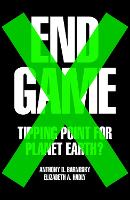


|
|
| book details |
End Game: Tipping Point for Planet Earth?
By (author) Professor Anthony Barnosky, By (author) Professor Elizabeth Hadly

|
This book is currently unavailable. Enquire to check if we can source a used copy
|
| book description |
What happens when vast population growth endangers the world’s food supplies? Or our water? Our energy needs, climate, or environment? Or the planet’s biodiversity? What happens if these all become critical at once? Just what is our future? In End Game, world-renowned scientists Anthony Barnosky and Elizabeth Hadly explain the growing threats to humanity as the planet edges towards a resource war for remaining space, food, oil and water. And as they show, these wars are not the nightmares of a dystopian future but are already happening today. They explore the origins of Ebola in densely populated areas of south-eastern Guinea, witness raging fires in Yellowstone and Colorado and explain how drought-induced food shortages are already causing problems in the Sudan, Gaza Strip and Iraq. Finally, they ask: at what point will inaction become the break-up of the intricate workings of the global society? The planet is in danger now, but the solutions, as Barnosky and Hadly show, are still available. We still have the chance to avoid the tipping point and to make the future better. But this window of opportunity is closing fast and will shut within ten-to-twenty years. End Game is the call we need.
| product details |
Normally shipped |
Publisher | HarperCollins Publishers
Published date | 2 Jul 2015
Language |
Format | Hardback
Pages | 272
Dimensions | 240 x 159 x 29mm (L x W x H)
Weight | 550g
ISBN | 978-0-0075-4815-6
Readership Age |
BISAC | science / life sciences / ecology
| other options |
|
|
|
To view the items in your trolley please sign in.
| sign in |
|
|
|
| specials |
|
|
An epic love story with the pulse of a thriller that asks: what would you risk for a second chance at first love?
|

|
Mason Coile
Paperback / softback
224 pages
was: R 520.95
now: R 468.95
|
A terrifying locked-room mystery set in a remote outpost on Mars.
|
|
|
|
|